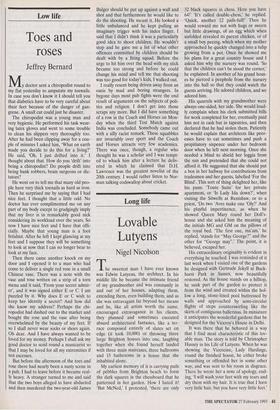Long life
Lovable Lutyens
Nigel Nicolson
The sweetest man I have ever known was Edwin Lutyens, the architect. In his middle life he became the intimate friend of my grandmother and was constantly in and out of her houses, adapting them, extending them, even building them, and as she was extravagant far beyond her means and he, like all artists worth the name, encouraged extravagance in his clients, they planned and sometimes executed absurd architectural fantasies, like a ter- race composed entirely of slates set on edge (it took 10,000) or throwing three large Brighton houses into one, laughing together when she found herself landed with three main staircases, three ballrooms and 15 bathrooms in a house that she inhabited alone.
My earliest memory of it is carrying pails of pebbles from Brighton beach to form the dark squares in the chessboard that he patterned in her garden. How I hated it! `But McNed,' I protested, 'there are only 32 black squares in chess. Here you have 64!"It's called double-chess,' he replied. `Quick, another 12 pails-full!' Then he would reward me not with hugs or sweets but little drawings, of an egg which when unfolded revealed its parent chicken, or of a small boy peeing, which when my mother approached he quickly changed into a tulip growing from a pot. Once he showed me his plans for a great country house and I asked him why the nursery was round. 'So that the children can't be stood the corner,' he explained. In another of his grand hous- es he pierced a peephole from the nursery into the hall so that they could watch the guests arriving. He adored children, and we adored him.
His quarrels with my grandmother were always one-sided, her side. She would loud- ly complain when his clerk submitted bills for work completed for her, eventually paid him not in cash but in tapestries, and then declared that he had stolen them. Patiently he would explain that architects like peer- esses have to eat sometimes and push a propitiatory sixpence under her bedroom door when he left next morning. Once she needed a blind to shield her loggia from the sun and pretended that she could not afford it. He suggested that she should put a box in her hallway for contributions from tradesmen and her guests, labelled 'For the Blind'. This sort of thing delighted her, like his puns: `Toute Suite' for her private apartment, or 'Is Lady Ida down?', when visiting the Sitwells at Renishaw, or to a priest, `Do two 'Ayes make one 'Oly?' And his playful impertinence, as when he showed Queen Mary round her Doll's- house and she asked him the meaning of the initials MG and GM on the pillows of the royal bed. 'The first one, ma'am,' he replied, 'stands for "May George?" and the other for "George may".' The point, it is believed, escaped her.
His extraordinary originality is evident in everything he touched. I was reminded of it last week when 1 visited one of the gardens he designed with Gertrude Jekyll at Buck- hurst Park in Sussex, now beautifully restored. As the house stands on a hilltop, he sunk part of the garden to protect it from the wind and created within the hol- low a long, stone-lined pool buttressed by walls and approached by semi-circular flights of steps counterswirling like the skirts of contiguous ballerinas. In miniature it anticipates the wonderful gardens that he designed for the Viceroy's House in Delhi.
It was there that he behaved in a way that I find most characteristic of this lov- able man. The story is told by Christopher Hussey in his Life of Lutyens. When he was showing the Vicereine, Lady Hardinge, round the finished house, he either broke something or offended her in some other way, and was sent to his room in disgrace. There he wrote her a note of apology, end- ing, 'I will wash your feet with my tears and dry them with my hair. It is true that I have very little hair, but you have very little feet.'


















































 Previous page
Previous page